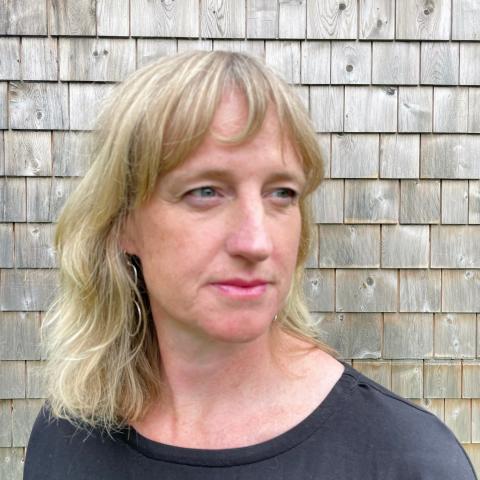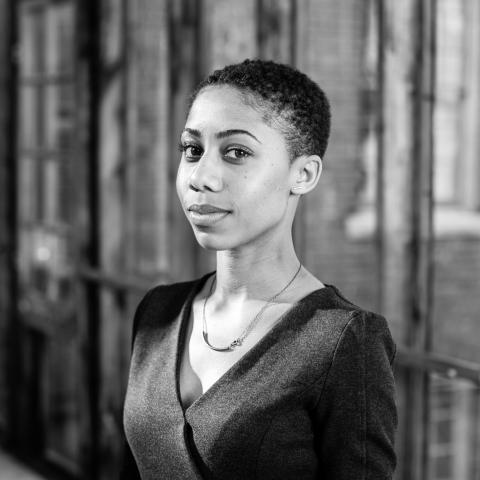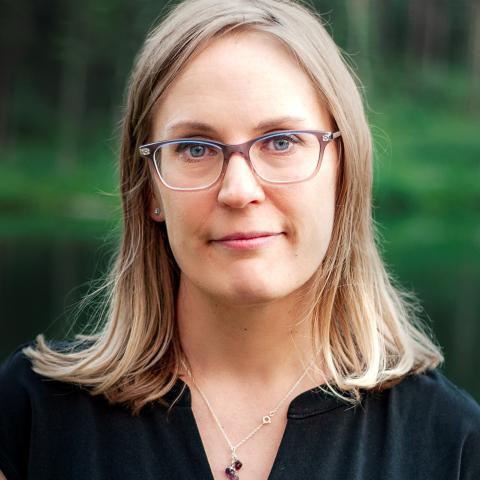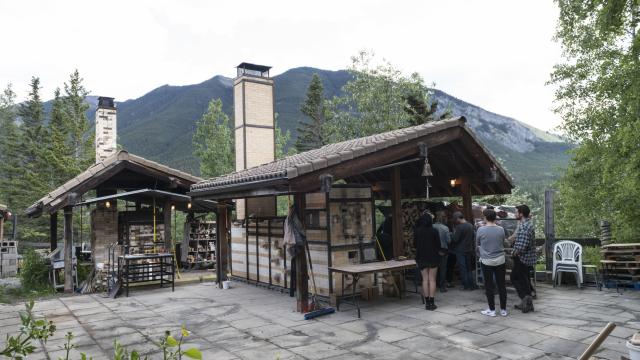Want to find out more about upcoming programs? Please subscribe to our mailing list.
Information sur le programme
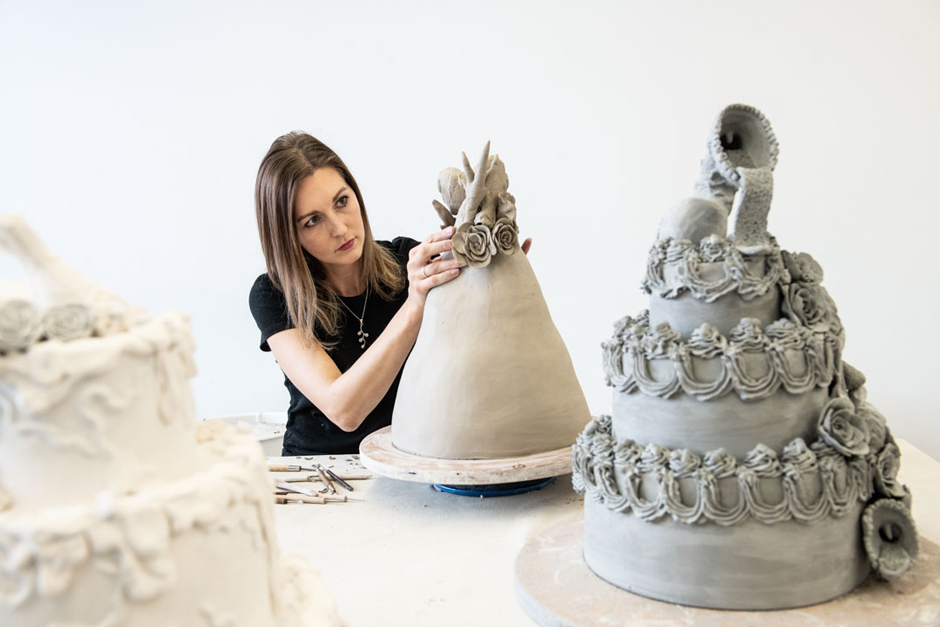
Julianna Zwierciadlowska-Rhymer, Banff Centre 2023, photo by Rita Taylor.
Aperçu du programme
Le programme « Artiste émergent en résidence à Banff » est une formule immersive qui met à la disposition d’artistes en arts visuels en début de carrière un studio de travail, des installations de production et l’appui de mentors.
Le programme « Artiste émergent en résidence à Banff » allie la liberté artistique d’une résidence autodirigée et le soutien d’un programme organisé. En plus d’avoir un espace où créer, faire de la recherche et expérimenter, les participants se retrouveront au sein d’une communauté d’artistes émergents déterminés à approfondir et à enrichir leur démarche artistique.
Que propose le programme?
Au cours d'une période de cinq semaines, les participants auront maintes occasions de perfectionner leur pratique individuelle et de collaborer avec leurs pairs ainsi que de leur présenter leur travail, participer à la critique d’œuvres, s’inspirer des démonstrations de diverses techniques de production d’arts visuels et de développer des compétences professionnelles. Ils bénéficieront également de conseils de professeurs aguerris lors de consultations, de visites en studio et de divers événements sur le campus.
Notre personnel compétent sera à leur disposition pour faire des démonstrations, offrir un soutien technique et donner accès aux installations de photographie, de sculpture, de création d’estampes, de fabrication de papier, de céramique, de textile, de vidéo, et de technologie numérique.
À qui le programme s’adresse-t-il?
Cette résidence est destinée aux artistes émergents qui ont reçu une formation de niveau universitaire en arts visuels ou qui ont acquis une expérience équivalente et la reconnaissance de leurs pairs.
La priorité sera accordée aux artistes qui on terminé une formation pertinente dans les trois ans et qui n'ont jamais participé à une résidence au Banff Centre.
Corps enseignant
Ce qui est compris
Your program fee includes a single bedroom on the Banff Centre campus for the duration of your program.
Get connected with other artists on campus and focus on your projects in a creative environment while we take care of the day-to-day essentials.
Using a credit-based system to dine on campus, our flexible meal plans allow you to select meals according to your own needs during your stay. Banff Centre can respond to most dietary requests.
The Full Flex meal plan is equivalent to $58 credit per day, equivalent to breakfast, lunch and dinner at our Buffet service.
The Paul D. Fleck Library and Archives - Current Services
The Library is delighted to support Banff Centre Participants, Artists, and Faculty with the following services:
- Open hours: 9:30 am to 1 pm, Mondays, Wednesdays, and Fridays.
- Access to collections, including program relevant books, scores, artists’ books, recordings, periodicals, and object library.
- Library accounts for borrowing materials.
- Digital Library, on campus and remote access.
- Library research assistance, by appointment.
- Archives research, by appointment only.
Please email library@banffcentre.ca or archives@banffcentre.ca for more information or assistance.
Your program fee includes free access to the swimming pool, climbing gym and fitness suite as well as discounted rates for classes at the Sally Borden Fitness and Recreation Centre.
Create in one of our specialized studios and utilize shared production facilities in printmaking, ceramics, sculpture, photography, digital media and more (subject to additional fees)
A series of outstanding guest artists and curators will give free public talks and hold informal discussions.
Enrich your experience and get to know other artists on campus by taking advantage of the activities and support provided by our Participant Resources team.
This program offers opportunities to showcase your work-in-progress in [one of our performance venues / an open studios event in Glyde Hall].
Join in group seminars/workshops.
Enjoy special artist rates for ticketed performances or complimentary access to events.
Coûts et aide financière
Droit de demande: 65 $ (35$ pour les candidats qui s’identifient comme Autochtones)
*Il est possible d’obtenir une aide financière couvrant jusqu’à 100 % des frais de scolarité, et Une aide financière de 50 % est disponible pour compenser les frais de nourriture et d'hébergement.
Si vous souhaitez être pris en compte, veuillez compléter la section Aide financière lors du téléchargement de vos documents justificatifs.
Contribuez à trouver le financement nécessaire pour votre expérience au Banff Centre! Consultez une liste de possibilités de financement d’ordre national et international ici.
Le Centre des arts de Banff fournira des reçus officiels pour les frais de scolarité admissibles ainsi que pour l’aide financière et les bourses, comme l’exige la Loi de l’impôt sur le revenu. Vous recevrez un T2202 (Certificat pour frais de scolarité et d’inscription) pour les frais de scolarité admissibles payés, et un T4A (État du revenu de pension, de retraite, de rente ou d’autres sources) pour l’aide financière et les bourses applicables.
Comment faire une demande
Apprenez-en plus sur les étapes pour compléter votre candidature.
Resume
A one-page resume describing your academic, artistic, professional, and other relevant artistic experience.
Letter of Intent
A 500 word description of why you wish to attend this program, what you hope to learn or achieve and what impact it could have on your artistic practice.
Project Summary
Provide a 100-word summary of the proposed project. These summaries will be used as a narrative for administrative and public use.
Detailed Project Proposal and Timeline
In 500 - 1000 words, describe the conceptual framework of your proposed project, your weekly execution plan, details of the mediums you propose to use and your level of knowledge in the processes required, and outline any specific technical or support requirements.
Resource Request
Outline all studio, equipment, software, facility, or staff support requested in our upload tool. Final resource allocation is at the discretion of the department.
Portfolio
Provide 10 samples of your artistic work. Curators and researchers must submit three samples of written work. File sizes and specifications are available in our upload tool.
Processus de sélection
La sélection des participants est faite en fonction du mérite artistique, de l’effet potentiel du programme sur la démarche ou la carrière de l’artiste, de la faisabilité du projet et de la capacité du Banff Centre à aider à la réalisation de celui-ci. Le projet doit également cadrer avec les valeurs et les orientations stratégiques du Banff Centre telles que décrites dans son plan stratégique. Les participants sont sélectionnés par les membres d’un jury impartial, experts de leurs disciplines, en fonction des documents soumis. Le Banff Centre comprend qu’il est nécessaire pour les artistes d’avoir assez de temps pour planifier leur visite ; les candidats seront donc avisés dès que le processus de sélection sera terminé.
Candidats internationaux
Le centre des arts de Banff Centre accepte les candidats du Canada et de l’étranger à ce programme. Veuillez noter que le Centre des arts de Banff n’est pas un établissement permettant l’octroi d’un visa étudiant. Il incombe aux candidats sélectionnés de déterminer les exigences relatives à l’immigration pertinentes à leur entrée au Canada à titre de visiteur de leur pays d’origine, et de se conformer à celles-ci. Les candidats ayant besoin d’un visa de visiteur sont priés de s’informer sur le délai de traitement prévisible avant de présenter leur demande. Le résultat de la sélection des candidats devrait être connu de 4 à 6 semaines après la date limite d’inscription au programme.
Admissibilité
Les candidats doivent être âgés de 18 ans et plus au moment de la date de début du programme.
Contactez les admissions
Pour toute question relative à la préparation de votre candidature, veuillez contacter les admissions:
